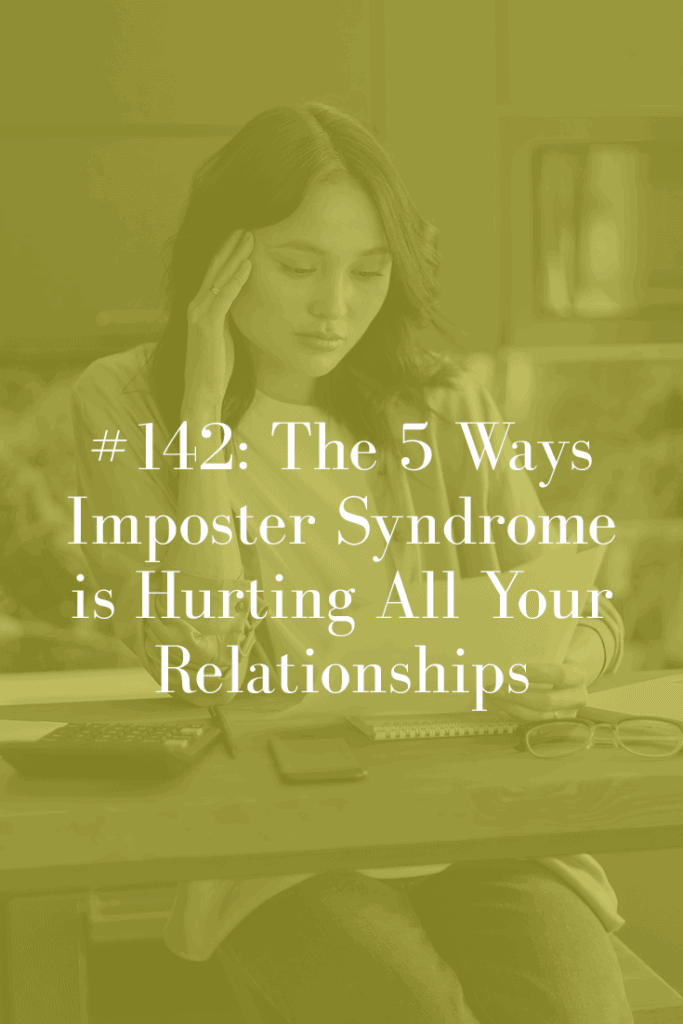
Want to read the more in-depth version? Click here to read the blog!
When you get a compliment do you say things like: “I just got lucky;” “We did so well on that project because Jane was running it;” “I’m not really a good mom – I’ve got a lot of help”? Then you may have Imposter Syndrome. Today you’ll learn the signs and symptoms of Imposter Syndrome and the five ways it’s hurting all your relationships.
What is it Exactly?
In 1978 psychologists Pauline Clance and Suzanne Imes wrote a paper about high achieving women who felt like they were phonies at work. These women had an underlying belief that they had somehow fooled bosses and colleagues into believing they were intelligent but inside they felt they hadn’t really earned their status at their jobs and had just gotten lucky. They felt unworthy and anxious that they’d be discovered. Clance and Imes called it “The Imposter Phenomenon.” It has since been renamed “Imposter Syndrome” and applies to anyone who feels like a fake, anywhere in their life.
Have you subscribed to my newsletter yet? Sign up today to get my weekly thoughts, best practices and funny stories (you won’t believe my life!). This weekly reminder will keep you on the path to creating connected, happy relationships (especially the one with yourself)! Scroll down and sign up below!
Symptoms of Imposter Syndrome:
- You doubt yourself often and always want to have someone else give their opinion on your decisions.
- You have a lot of difficulty owning your accomplishments, so you attribute any success you have to external factors: something or someone outside yourself (“I just got lucky;” “We did so well on that project because Jane was running it;” “I’m not really a good mom – I’ve got a lot of help.”).
- You obsess and agonize over even the smallest mistakes you make.
- You feel undeserving of your job or your relationship.
- You think things are too good to be true.
- You’re fearful of not living up to expectations so you either overachieve or opt out completely.
- You’ve been told you sabotage things when they’re going well at work or at home.
- You think that others will eventually find out you’re a fraud.
- You don’t think you’ve “done or accomplished enough.”
- You’re overly concerned with what others think of you and you’re constantly looking for their approval.
- If you’re not validated and approved by others, you don’t feel good about yourself or what you’ve done.
- You think thoughts like: “He deserves better than me” or “I’m not good enough for her.”
It’s time to talk about the 5 Ways Imposter Syndrome is Hurting Your Relationships:
1. You Don’t Trust
Research has shown that people who have Imposter Syndrome have trouble trusting others.
2. You Doubt Those Around You
When you have low self-esteem and feel like an imposter, you doubt those around you and start to see them more negatively.
3. You Sabotage
This same research shows that those people with Imposter Syndrome view their work and personal relationships as less stable than they actually are. You then become fearful of being abandoned, rejected or fired. Your anxiety amps up and you might unconsciously find ways to quit your job or leave a relationship so that you leave before they do!
4. You’re Angry, Blaming and Resentful
Because you’re constantly looking for outside validation to feel good about yourself, and because those outside assurances are never enough, you end up feeling angry, resentful and blaming those around you.
5. You Settle
At work, you might settle for a job that isn’t “reaching for the stars” because you don’t want the attention (they might expect too much). If you do take on a higher-level job, you might put up with bosses that are abusive or treat you poorly. In a love relationship, you might settle for someone who’s also abusive, or who’s dependent on you and needs you (they’ll never leave me).
RESOURCES
How to Own Your Shit and Stop Blaming Other People
Self-Sabotage: What it Is, Why You Do it, and How to Make it Stop
Self-Sabotage in Romantic Relationships
8 Ways to Build Your Confidence and Self-Esteem
RESEARCH
Jaruwan Sakulku, “The Impostor Phenomenon,” Journal of Behavioral Science 6, no. 1 (2011): 75-97.












